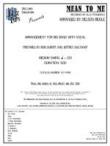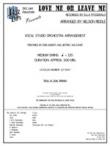TOO MARVELOUS FOR WORDS [DOWNLOAD]
Recorded by Ella Fitzgerald
Arranged by Nelson Riddle, Prepared by Dylan Canterbury, Rob DuBoff, and Jeffrey Sultanof

Cat #: JLP-9633DL
$65.00This product is available for immediate download after purchase.
Questions?
Please call +1-518-587-1102 or email us.
Edition: Jazz Studio Orchestra Arrangement
Description: Swing - Medium
Publisher: Jazz Lines Publications
Nelson Riddle originally lent his iconic arranging touch to Johnny Mercer and Richard Whiting's Too Marvelous For Words for Frank Sinatra's 1956 album Songs For Swingin' Lovers. This version, recorded nearly a decade later by Ella Fitzgerald, maintains a similar level of sweetness and levity as the Sinatra version while making enough changes to properly accompany Fitzgerald's markedly different vocal approach.
Things begin with a simple, almost Basie-esque saxophone riff over a gentle rhythm section accompaniment. The string-like pads in the woodwinds and horns provide some added warmth before the vocalist enters at measure 9. The introductory riff continues to provide accompaniment, being passed from the saxophones to the trombones at measure 17 before an ascending woodwind line sets up the bridge, where the full ensemble plays some syncopated backgrounds to break things up a bit.
The ensemble kicks into a higher gear for the ensemble shout at measure 41. Throughout the shout, Riddle provides ample gaps for a piano solo to shine through the brass and saxophones. The same ascending woodwind line from before sets up a recap of the bridge and the vocalist's re-entry at measure 57, ultimately leading to the final harmonically tricky ensemble figure at measure 73. The arrangement comes to a conclusion with a brief bass trombone solo followed by a sugary sweet chord in the woodwinds, horns and rhythm section played at a volume level barely above a whisper.
This arrangement is for female vocal soloist and studio orchestra. In lieu of the typical string ensemble, this time the big band is augmented by 2 flutes, 2 oboes, 2 clarinets, 2 bassoons, and 3 horns in F instead of the typical strings. The story goes that Norman Granz was concerned about the budget and refused to hire string players. Thus, Riddle saved some money and hired some additional woodwind players and probably relied on overdubs to complete the mix. This publication is presented as-written by Riddle but also included are optional string parts that may be used in place of - or in addition to - the woodwind and French horn parts. Although the original woodwind and horn parts appear to be missing, a separate set of parts that incorporated several of their missing sections into the main ensemble was utilized to re-create them. In addition, an optional synthesizer part is also included that may be used in place of the string parts so this arrangement may be played by a standard big band with a synthesizer player. The vocal key is C.
This publication has been prepared from the original set of parts used during the recording session - this is not a transcription.
Vocal
2 Flutes (Optional)
2 Oboes (Optional)
2 Clarinets (Optional)
2 Bassoons (Optional)
2 Alto Saxophones
2 Tenor Saxophones
Baritone Saxophone
4 Trumpets
3 Horns in F (Optional)
3 Trombones
Bass Trombone
3 Violins (Optional Alternate Part for Woodwinds)
Viola (Optional Alternate Part for Woodwinds)
3 Celli (Optional Alternate Part for Horns in F)
Harp
Guitar
Piano
Bass
Percussion: Vibraphone
Drums
Trumpet 1: D6
Trombone 1: Bb4










